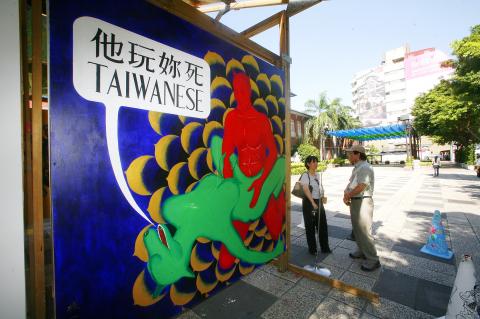Controversy on Thursday surrounded a mural in front of the Taipei Museum of Contemporary Art by local avant-garde artist Yao Jui-chung (姚瑞中) in which the word “Taiwanese” is transliterated into the Chinese characters for Ta wan ni ssu (他玩妳死), meaning “He plays, you die.”
The characters were used in the title of Yao’s painting, which features a red demon copulating with a green animal-headed female while she gives a thumbs up with her right hand.
Visiting with officials from the Museum and the Bureau of Cultural Affairs, Taipei City Councilor Wang Shih-chien (王世堅) said the painting insinuated that Taiwanese were represented by the female figure, who Wang said was being raped.

Photo: Liu Jong, Taipei Times
Wang said the creative, artistic process should have absolute freedom, but art should not be derogatory to others and engage in self-defamation.
In addition, because the painting was placed at the front of the museum plaza and right next to a pedestrian sidewalk on Chang-an W Road, people in the surrounding neighborhood might complain about what could be perceived as the city government’s use of taxpayer money to subsidize creations that set a “bad example” for children, Wang said.
Although there is a notice warning that the painting is “R-rated,” which says children under the age of 12 should be accompanied by parents when viewing the painting, local residents said the warning is meaningless in a public space.
Museum executive director Shih Jui-jen (石瑞仁) said the museum respected artists’ right to freely express themselves and that “nude does not necessarily represent sex.”
Shih and Wang argued about the issue at the site and the incident was finally resolved when Kuo Pei-yu (郭珮瑜), third section chief of the Bureau of Cultural Affairs, agreed to move the painting to the inner part of the plaza.
Kuo said the museum hoped to be able to relocate the painting within a week.
Yao said the intention of his painting was to approach the notions of country and nationality in a humorous manner and that the work had nothing to do with the pan-green or pan-blue camps.
The mural is part of a series titled Cynic’s Republic, which includes other pieces that use other nations’ names, such as Japan and China, Yao said, adding that the paintings were simply an expression of esthetics and that critics were overreacting.
Yao said the red devil represented the evil forces of authority, while the beast-headed female represented the silent public and the cynic because even while being raped, she was still giving the thumbs up.
The figure of the female was also a representation of chaos in Taiwan, Yao said.
In 2007, a similar painting by Yao was shown at the Shanghai Art Fair with a title that transliterated to Chuai ni ssu (踹你死), meaning “to kick you to death.” The work was removed from the exhibition after a day.
“I thought this was something that only happened in authoritarian countries,” Yao said of the affair.
New Taiwan Wall Painting Team curator Jiang Yao-xian (蔣耀賢) said the artists themselves had come up with the funds for the exhibitions.
No government subsidies were involved and controversy over one painting is unfair, Jiang said.
Art critic Huang Hai-ming (黃海鳴) said Yao was a well-known contemporary artist who was known to be concerned with political problems.
Haung said Yao is not concerned about sex, but he is trying to satirize politics through art, and this is one of Yao’s important characteristics.
TRANSLATED BY JAKE CHUNG, STAFF WRITER

An essay competition jointly organized by a local writing society and a publisher affiliated with the Chinese Communist Party (CCP) might have contravened the Act Governing Relations Between the People of the Taiwan Area and the Mainland Area (臺灣地區與大陸地區人民關係條例), the Mainland Affairs Council (MAC) said on Thursday. “In this case, the partner organization is clearly an agency under the CCP’s Fujian Provincial Committee,” MAC Deputy Minister and spokesperson Liang Wen-chieh (梁文傑) said at a news briefing in Taipei. “It also involves bringing Taiwanese students to China with all-expenses-paid arrangements to attend award ceremonies and camps,” Liang said. Those two “characteristics” are typically sufficient

A magnitude 5.9 earthquake that struck about 33km off the coast of Hualien City was the "main shock" in a series of quakes in the area, with aftershocks expected over the next three days, the Central Weather Administration (CWA) said yesterday. Prior to the magnitude 5.9 quake shaking most of Taiwan at 6:53pm yesterday, six other earthquakes stronger than a magnitude of 4, starting with a magnitude 5.5 quake at 6:09pm, occurred in the area. CWA Seismological Center Director Wu Chien-fu (吳健富) confirmed that the quakes were all part of the same series and that the magnitude 5.5 temblor was

The brilliant blue waters, thick foliage and bucolic atmosphere on this seemingly idyllic archipelago deep in the Pacific Ocean belie the key role it now plays in a titanic geopolitical struggle. Palau is again on the front line as China, and the US and its allies prepare their forces in an intensifying contest for control over the Asia-Pacific region. The democratic nation of just 17,000 people hosts US-controlled airstrips and soon-to-be-completed radar installations that the US military describes as “critical” to monitoring vast swathes of water and airspace. It is also a key piece of the second island chain, a string of

The Central Weather Administration has issued a heat alert for southeastern Taiwan, warning of temperatures as high as 36°C today, while alerting some coastal areas of strong winds later in the day. Kaohsiung’s Neimen District (內門) and Pingtung County’s Neipu Township (內埔) are under an orange heat alert, which warns of temperatures as high as 36°C for three consecutive days, the CWA said, citing southwest winds. The heat would also extend to Tainan’s Nansi (楠西) and Yujing (玉井) districts, as well as Pingtung’s Gaoshu (高樹), Yanpu (鹽埔) and Majia (瑪家) townships, it said, forecasting highs of up to 36°C in those areas